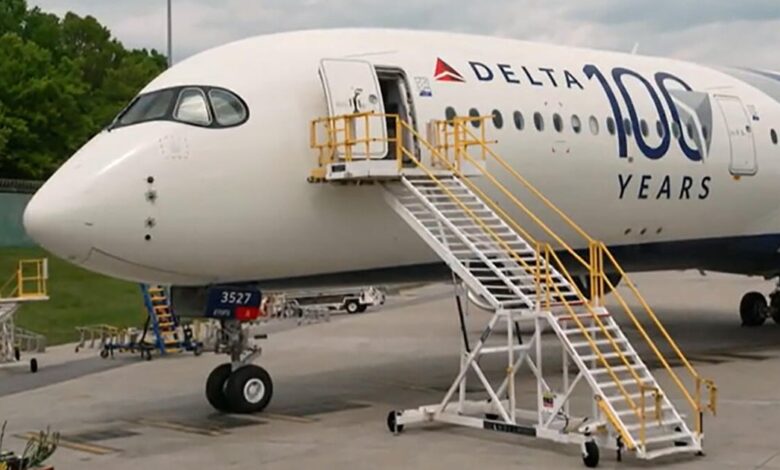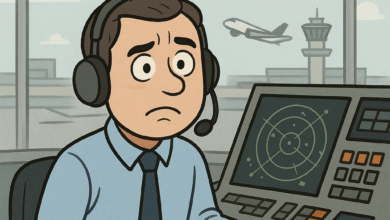Delta Air Lines’ 100th year takes flight

The Delta Flight Museum Surplus Sale is not your average garage sale. Held in the shadow of the world’s busiest airport, aviation enthusiasts flock to this monthly event to snag a piece of airline history. From seats to engine parts, Delta Air Lines offers a wide range of surplus items for sale, drawing fans from near and far.
One such fan, Sarah Zeis, traveled all the way from Michigan in search of a well-used beverage cart. She explained that she needed a bar cart of specific dimensions for her apartment and was thrilled to find the perfect piece of aviation history at the sale. Zeis, like many others, came prepared with empty bags to bring her newfound treasure back home.
The proceeds from the surplus sale go directly to the Delta Flight Museum, located just across the parking lot. The museum is currently celebrating Delta Air Lines’ 100th year in operation, marking a significant milestone for the American carrier. Visitors can explore a century of service and history, starting from the airline’s humble beginnings.
Delta Air Lines traces its roots back to a unique origin story involving the boll weevil, a tiny pest that led to the creation of Huff-Daland Dusters in 1925. Originally a crop-dusting company based in Macon, Georgia, the business soon realized the potential in the Mississippi Delta region, giving rise to the name Delta. Marie Force, the archives director, describes Delta’s beginnings as one-of-a-kind in the U.S. airline industry.
In 1929, Delta Air Lines made the leap from pest control to passenger service under the leadership of founder C.E. Woolman. The airline’s first passenger flight took travelers from Dallas, Texas, to Jackson, Mississippi, with stops in Louisiana along the way. Priced at $90 round trip, equivalent to roughly $1,700 today, air travel was a luxury reserved for the elite.
As aviation enthusiasts sift through the surplus items at the Delta Flight Museum sale, they not only find unique pieces of airline memorabilia but also connect with the rich history of Delta Air Lines. From the airline’s humble beginnings as a crop-dusting company to its evolution into a major carrier, each item for sale holds a piece of the airline’s legacy. For fans like Sarah Zeis, owning a part of this history is a special way to commemorate Delta’s 100 years of service. Delta Air Lines has come a long way since its inception nearly a century ago. What started with a single route to now over 5,000 flights a day, Delta has grown to become a global force in the airline industry. The airline has weathered mergers, recessions, and bankruptcy to emerge as a nationwide carrier, offering flights to destinations around the world.
In the early days of air travel, Delta catered primarily to businessmen looking to speed up their trips. Back then, about 80% of Delta’s passengers were businessmen, eager to cut down a 12-hour train journey to a five-hour flight. This was the era of the “Golden Age” of air travel, characterized by exceptional service, extravagant meals, and passengers dressed to the nines.
Flight attendants like Susan Slater and Kay Carpenter, who have been with Delta for over 60 years, embody the glamour and elegance of that era. Slater reminisces about the weight restrictions and appearance guidelines that were in place for flight attendants back then, highlighting the allure of the job. Despite the nostalgia for the past, industry analyst Henry Harteveldt emphasizes that flying today is more convenient, reliable, and safe than it was in the 1960s.
Ed Bastian, the CEO of Delta Air Lines, acknowledges the evolution of air travel, with flying becoming more accessible and affordable for passengers. While low fares are still a priority for some travelers, Delta has built its business around providing a premium experience. Bastian stresses the importance of offering a high-quality product to attract passengers, even as the airline faces challenges like economic uncertainty and safety concerns.
As Delta celebrates its 100th summer, Bastian looks to the future, envisioning a world where air travel is more accessible, affordable, and sustainable. He believes that Delta’s role in connecting people and shrinking the world is crucial, especially as only one in five people globally have ever been on an airplane. The airline’s growth and success over the years are attributed to dedicated employees like Slater and Carpenter, who have witnessed Delta’s transformation from flying small planes to six continents.
As Delta embarks on its next hundred years, the focus remains on making air travel more inclusive and interconnected. The legacy of Delta’s past is a testament to its resilience and adaptability, paving the way for a future where the world is more connected than ever before. The famous quote “But a mile on a runway will take you anywhere” holds true for many, especially for those who work in the aviation industry. Kay Carpenter and Susan Slater, two dedicated flight attendants for Delta Airlines, embody this sentiment as they have been serving passengers since the mid-1960s. Their commitment to their jobs and passion for travel have allowed them to see the world and make a difference in the lives of countless travelers.
With a mile of runway, the possibilities are endless. It represents the beginning of a journey, whether it’s a short domestic flight or a long-haul international trip. For Kay and Susan, every takeoff is a new adventure, and every landing is a chance to make a difference in someone’s day. Their dedication to providing exceptional service and ensuring the safety and comfort of passengers has earned them the respect and admiration of both colleagues and travelers alike.
In the fast-paced world of aviation, where schedules can change in an instant and delays are a common occurrence, Kay and Susan remain calm and composed, handling any situation with grace and professionalism. Their years of experience have equipped them with the skills and knowledge needed to navigate the challenges of air travel, from turbulent weather to demanding passengers.
As flight attendants, Kay and Susan play a crucial role in ensuring the smooth operation of each flight. They are responsible for the safety and well-being of passengers, from providing instructions during emergencies to serving meals and beverages with a smile. Their dedication to their job goes beyond the call of duty, as they often go above and beyond to make each passenger feel valued and appreciated.
The aviation industry is constantly evolving, with new technologies and innovations shaping the way we travel. Despite these changes, the core principles of excellent customer service and attention to detail remain the same. Kay and Susan’s commitment to these values is what sets them apart and makes them stand out in a competitive industry.
In conclusion, the quote “But a mile on a runway will take you anywhere” serves as a reminder of the endless possibilities that come with air travel. For Kay Carpenter and Susan Slater, it represents a lifetime of experiences, memories, and friendships made along the way. Their dedication to their jobs and passion for travel have made them true ambassadors of the aviation industry, inspiring others to pursue their dreams and see the world one mile at a time.





